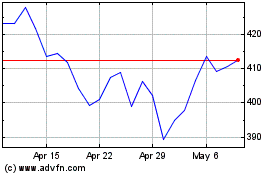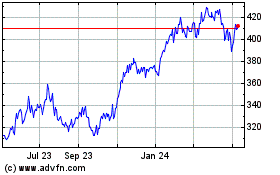Amazon, Microsoft Dial Up Efforts to Win Telecom Cloud Business -- Journal Report
November 10 2020 - 5:59AM
Dow Jones News
By Aaron Tilley
The rollout of 5G networks isn't just a major business
opportunity for smartphone makers and telecommunications providers.
Microsoft Corp., Amazon.com Inc. and Alphabet Inc.'s Google also
are ready to pounce.
Those tech giants are trying to capitalize on the massive
investments telecom providers such as Verizon Communications Inc.
and Vodafone Group PLC are making to upgrade their networks, by
luring them to adopt their cloud-computing infrastructure. They are
doing that with the promise of helping the telecom companies
deliver 5G's faster speeds and higher data capacity more
cheaply.
The competition for telecom customers is the latest battleground
between Amazon, the leader in the cloud-computing market, and No. 2
Microsoft for market dominance.
"We're at a critical juncture," says Yousef Khalidi, who leads a
newly formed unit within Microsoft's Azure cloud-computing service
focused on the telecom business.
A running battle
Amazon stepped up its effort to secure telecom business two
years ago. Verizon already was using Amazon Web Services cloud
computing for internal, day-to-day corporate network functions but
was starting to explore if there was potential to use the cloud for
its telecom business, says Dave Brown, a vice president at Amazon
Web Services, the largest cloud provider.
At the time, AWS didn't lend itself to that application, Mr.
Brown says. AWS could operate only on its own data centers. To
achieve the high connection speeds Verizon needed to run its
communications networks, AWS would have to have servers closer to
its customer. So Amazon devised a server it could park inside
Verizon's own facilities and run cloud services from there.
Last year, Microsoft signed a broad alliance with AT&T, and
last November the companies announced early progress in using Azure
to deliver the telecom provider's 5G network in certain markets.
Amazon Web Services announced a similar partnership with Verizon
late last year.
Then this year, Microsoft agreed to acquire Affirmed Networks
and Metaswitch Networks, which both develop software to help manage
telecom networks. The software giant shelled out almost $2 billion
combined on those deals, according to people familiar with the
agreements, in part to keep pace with Amazon.
Google's cloud unit, a distant third behind Amazon and
Microsoft, according to research firm Gartner Inc., also is trying
to win a part of the telecom business. Google Cloud Chief Executive
Thomas Kurian this year unveiled a strategy to secure telecom
customers, including cloud software the telecom providers can run
on their own networks.
A new network approach
The shift to the cloud for telecommunications was largely made
possible by the emergence of a new way for the telecom companies to
route data. For years, companies had to invest in expensive
hardware from vendors such as Cisco Systems Inc. and China's Huawei
Technologies Co. Then an approach called software-defined
networking emerged. Effectively, it allowed telecom companies to
use smart software and off-the-shelf hardware to run their service
and replace the expensive networking gear.
"Software-defined networks are the future, hands down," says
Dmitry Netis, managing director at Q Advisors LLC, an investment
firm. "It makes the network more agile and allows carriers to bring
in new workloads and use cases."
The partnerships between the telecom and tech companies aren't
tension-free, though. "Telcos are looking at these partnerships
warily," says Roy Chua, founder and principal at AvidThink, a
research and advisory service. "Once they let them in, what does
that mean?"
Among the issues that analysts say could arise are questions
about sharing the revenue from new business generated by
cloud-based networks; the possibility that the telecom companies
will end up as simple conduits for data, or "dumb pipes" in
industry parlance, with all the value of new services going to the
cloud companies; and the possibility that the cloud providers could
eventually offer their own networking services over the cloud-based
networks.
Thierry Sender, a director at Verizon, says about the company's
developing partnerships with cloud giants: "We're all trying to
figure out how to best work together."
Mr. Tilley is a Wall Street Journal reporter based in San
Francisco. He can be reached at aaron.tilley@wsj.com.
(END) Dow Jones Newswires
November 10, 2020 05:44 ET (10:44 GMT)
Copyright (c) 2020 Dow Jones & Company, Inc.
Microsoft (NASDAQ:MSFT)
Historical Stock Chart
From Mar 2024 to Apr 2024

Microsoft (NASDAQ:MSFT)
Historical Stock Chart
From Apr 2023 to Apr 2024
